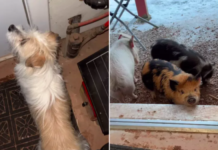Last Updated on January 18, 2024 by Fumipets
Pyredoodle
The Great Pyrenees and the Standard Poodle are mixed to create the Pyredoodle. The Pyredoodle is one of the world’s most devoted companion dogs. This huge dog is a protective crossbreed that takes traits from both parents and is content to watch over your family.
This designer dog, first developed in the 1980s, is a low-shedding kind ideal for allergy sufferers. There is a long history in the parent lineage. The Great Pyrenees originated in the 17th century and was often employed to protect sheep in the Pyrenees Mountains between France and Spain. The Standard Poodle goes back to the 16th century and was originally found in Germany.
This canine breed is said to be a gentle giant despite its enormous size. It gets along well with other animals, is compassionate and fiercely protective of small children. These puppies are perfect for big houses and apartments, whether you have a family or live alone.
Here are some advice and information you should be aware of if you’re thinking about obtaining a Pyredoodle for your household.
| Height: | 22-32 inches |
| Weight: | 85-100 pounds |
| Lifespan: | 10-12 years |
| Colors: | Black, white, grey, apricot, cream |
| Suitable for: | Families with kids and other pets, families who want a watchdog |
| Temperament: | Friendly, affectionate, and social puppy, loves spending time with family, protective. |
How Much Do Pyredoodle Puppies Cost?
The cost of a Pyredoodle depends on several factors, including the puppy’s pedigree, the location and reputation of the breeders, the size of the litter, training, socialization, and breed popularity. Obtaining one from a reputable breeder, a rescue organization, or your neighborhood rescue is simple.
A Pyredoodle may cost anywhere from $700 to $2,800, depending on the breed and traits you choose. The cost might rise to $7,000 or more for a puppy with breeding rights or one that is promoted as being of show quality. Only if you are paying for a better bloodline is this high price warranted.
However, the cost for most canines is often about $1,200. Therefore, be wary of breeders that offer low pricing as you shop. These low pricing can be a sign that you’re obtaining a dog that was bred improperly and has additional difficulties in addition to its health.

3 Little-Known Pyredoodle Facts
1. They Are Hypoallergenic
People with allergies may be very sensitive around pets. The Pyredoodle is a fantastic choice if you often sneeze around dogs. They shed extremely little while having thick coats, which is ideal for those with allergies.
It’s important to comprehend the traits of the breeding parent to recognize a pet that sheds less. The Standard Poodle in this instance sheds relatively little, which is passed down to the next generation. Whether a dog sheds a much depends on the dominant breed.
2. They Are Excellent Guard Dogs
The Great Pyrenees, the Pyredoodle’s progenitor breed, which the French formerly employed as guard dogs, imparted defensive characteristics to them. These canines have a commanding presence that serves as protection for your house from any visitors or invaders.
They develop protective tendencies as a result of their high intellect if they are socialized appropriately as puppies. When a stranger enters your yard or home, they’ll bark a lot to let you know. They are excellent nanny dogs as a result, particularly if you have small children.
Get a Pyredoodle for a watchdog if you need one.
3. They Are Good with Kids
This breed is a great option if you have kids despite its intimidating appearance. Pyredoodles are devoted, protective, and gentle giants. They also like watching over kids, so they would be a simple addition to your household.
The Pyredoodle is an excellent pet if your family and kids are active. They can engage with your children effectively if they are well-socialized.

Temperament & Intelligence of Pyredoodles
Pyredoodles are bright and very devoted breeds. They inherit intellectual qualities from their parent breed since they are descended from the learned Standard Poodle. It is affectionate and enjoys interacting with family members in its role as a family dog.
The temperament and intelligence of this breed make it a simple breed to teach. But early age should be used for the training. Since a puppy hasn’t developed any bad habits yet, training one is considerably simpler than training an older dog. However, since this breed is intelligent, you can still teach your mature dog.
Pyredoodles need to be properly socialized as early pups. The reason for this is because if they don’t socialize with other dogs and humans, they often develop into timid canines. A sociable dog is simpler to teach and has the self-assurance needed to protect your house. Include them in your family’s outings and walks while they are staying at your house.
Furthermore, because of their intellect, these breeds soon get bored if not kept mentally active. To keep your pet from being bored, get them some toys or puzzles and organize frequent exercise sessions. When your dog becomes bored, they can become destructive.
Are These Dogs Good for Families? 
Family dogs love pyredoodles. They make great watchdogs and are often friendly and loving with their owners and families. They are kind and non-aggressive to their caretakers since they get these characteristics from their parent breeds. They also like playing with kids and enjoying the spotlight.
Does This Breed Get Along with Other Pets?
If you want these dog breeds to get along with a family or other pets, they need early socialization. To help them socialize with humans and other canines from a young age and prepare for adulthood. As inherently timid dogs, this socializing greatly contributes to confidence development.
As soon as you get a puppy, you may enroll it in lessons where it will meet other dogs. You may also take them to a park where other dog owners are present. Walking your dog in these locations exposes them to different environments and helps them get used to meeting new people.
You should socialize your dog as an early puppy if you have other pets, such as cats. Pyredoodles usually get along well with other pets after they learn how to communicate with them.
Things to Know When Owning a Pyredoodle
Despite being a relatively low-maintenance dog, a Pyredoodle still need adequate care to be healthy. If you just adopted a dog from a breeder or a rescue organization in your area, you’ll need to have a clear understanding of its requirements.
Here are some aspects regarding the Pyredoodle breed that you should be aware of.

Food and Diet Requirements 
Because Pyredoodles are a huge dog breed, they need a lot of food. These canines have different dietary demands as they age.
By the time they reach 60 pounds in weight, your dog should be consuming roughly 1670 calories each day as a puppy. To maintain strong bones as we age, the meal should also be heavy in calcium and phosphorus.
When a puppy is less than three months old, you may feed them as often as you choose. With time, however, you may change this strategy to two or three times each day with sporadic indulgences.
Your dog should get roughly 2200 calories twice day as an adult. Remember that Pyredoodles are big dogs with a rapid tendency toward obesity. Maintain a balanced, protein-rich diet for them in order to keep them active and healthy.
There is no specialized special diet needed for this type of dog. They just need high-quality dry food that is balanced in terms of calories, protein, vitamins, and other minerals.
Exercise 
Pyredoodles need to exercise for at least 30 to 60 minutes each day. It is vital to keep them moving at all times because of their huge height, which makes them very susceptible to obesity. Although this breed is an active dog, it also has a tendency to be lethargic, which is why you should take a walk with it.
The ideal companions for hikers and joggers are Pyredoodles. Because they like intellectual stimulation, this kind of exercise will keep their minds engaged and occupied. Plan your excursion or stroll during a time when the weather won’t be too hot to avoid the dog overheating.
Pyredoodles can live in apartments, but they also need to spend some time outside. When your puppy is three months old, you may start taking him on short walks to exercise him.
You may gradually increase the walks’ duration and frequency as they become older. In addition to walks, you may take your dog swimming.
It is not advised to let these dogs run free at the dog park. They often stray, and when they encounter people, they may become hostile and protective. These actions will be restrained with a suitable leash.
Make sure the dog’s meal time is not during the scheduled exercise periods. To avoid bloating, schedule your meals for an hour or two before or after.
Training 
A Pyredoodle may be trained very easily because of their high intellect and easygoing demeanor, however they can be a bit obstinate. You must be resolute and steadfast in your training if you want to overcome this hurdle.
You should get encouraging feedback as you put the course into practice. It will be difficult for this breed to forget an unpleasant event like shouting since they tend to be timid. Negative events may increase the dog’s timidity and shyness.
In order to prevent monotony, the training also aids in cerebral stimulation. A balanced dog is ideal for your household.
Grooming 
The Pyredoodle has a genetic background that makes it a low shedder. Depending on the dominant breed they inherited, they have a short or long coat. The wavy short-to-medium coats resemble those of the Standard Poodle, while the longer, thicker coats resemble those of the Great Pyrenees.
The good news for Pyredoodle owners is that the Standard Poodle coat predominates and doesn’t shed at all. Those who have allergies will love this feature.
Even if your dog doesn’t shed much, frequent brushing is still necessary to keep him from matting. To remove the knots that formed when they were pups, use a comb. Additionally, you may see a groomer for your Pyredoodle every six to eight weeks. The dog’s skin troubles are prevented by regular grooming.
Bathing your pet should only be done when absolutely required. Numerous washing sessions affect the natural oils of the hairs.
In addition to the fur coat, you should clean your dog’s teeth on average three times every week. Also, keep your hygiene up by sometimes trimming your nails.
Health Conditions 
Designer crossbreeds, like Pyredoodles, are developed to avoid any potential health issues the parent breed may have. However, a number of ailments develop or go unnoticed by the breeder, particularly if they are inherited. While some of these are mild, others are serious.
Minor Conditions
• Hip dysplasia
• Eye problems
• Thyroid problems
Serious Conditions
• Bloating
• Joint and mobility issues
Minor Conditions
Hip Dysplasia
Hip dysplasia in dogs is quite common in pyredoodles. The parent breeds are responsible for this disease. Younger dogs may not find it bothersome, but it can be agonizing. Additionally, as they age, dogs with this genetic condition may acquire arthritis.
Eye Problems
The parent breeds both have vision issues. As a result, there is a chance that their kids may have the same health problems. It would thus be advisable if you have this tested before acquiring this breed.
Thyroid Problems
Testing for thyroid-related conditions should be done on the Great Pyrenees. If the Pyredoodle wasn’t properly screened, the insufficient thyroid hormone levels can be passed on to the Pyredoodle.
Serious Conditions
These illnesses have the potential to harm your pet severely. They consist of:
Bloating
Your dog may have painful digestion problems including bloating depending on the food. For instance, exercising your dog shortly after eating could result in bloating. Additionally, you must watch the diet to make sure it won’t hurt your pet’s digestive system.
When a dog’s stomach fills with air and they are unable to belch or vomit, bloat poses a life-threatening risk. When this problem worsens, the blood cannot reach the heart, endangering your pet’s life.
Joint and Mobility Issues
As they mature, Pyredoodle dogs are quite prone to have joint and mobility problems. If the joints are overworked while they are young, this issue will develop.
Make sure pups are kept away from the stairs until they are eight months old to avoid this. Additionally, they shouldn’t engage in strenuous activities like leaping till then.

Male vs. Female
In general, the male Pyredoodle is bigger and taller than its female counterpart. The temperaments of the two sexes tend to be similar and don’t vary much. The males, however, are more loving and obstinate than the females.
Conclusion
The clever Pyredoodle dog breed is a cross between two different breeds. It is the ideal dog for a household with children and other animals because of its devotion and protectiveness. It’s a big dog that’s known as the “gentle giant” because of how loving it is.
This breed requires extensive socialization as a puppy to feel at ease with other dogs and humans. Despite its enormous size, this dog has a tendency to be quite timid, so you’ll need to educate it gently to increase its confidence.
Keep in mind that these pups are susceptible to genetically transmitted illnesses when purchasing one from a breeder. Visit a reputed breeder who can do pre-tests to guarantee your dog’s health instead. Pay attention to expenses as well, and only purchase if the average price is fair. The Pyredoodle is the ideal breed for you if you’re seeking a family dog. It may flourish with minimal upkeep, routine grooming, an hour of exercise, and the right food and nutrients.


















